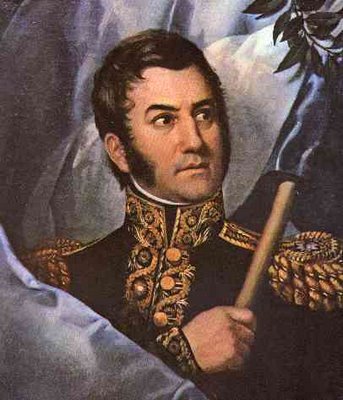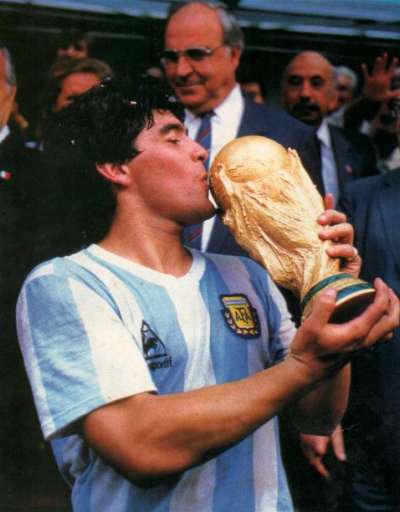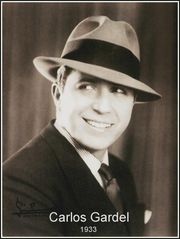A few Argentine heroes
General Jose de San Martín
A little history: San Martín liberated Argentina from Spanish rule. That's a pretty good one-sentence bio in and of itself, but it's only the start: after studying in Spain and fighting against Napoleon in the Battle of Baylen, San Martín returns to Argentina and quickly beats back the disembarking Spanish army arriving from Montevideo. He then decides that the only way to completely liberate Argentina is to unseat the Spanish royalists in the Viceroyalty of Peru, and so takes over as the Governor of Cuyo in western Argentina, and devotes three years to developing his strategy for conquering Peru. At some point the BsAs old boys feared his popularity and power, and tried to strip him of his Governorship, but protests in his support and against his successor force San Martín's reinstatement. In 1817, San Martín crosses the Andes and defeats the royalist forces in Chile, following it up with post-siege takeover of Lima. Checkmate. In 1824, depressed by civil wars and political infighting, San Martín moves to France to raise his daughter, dying in 1850, never living to see his dream of a strong and united South America.
And today: San Martín, the liberator of Argentina, Chile, and Peru, is interred in a magnificent mausoleum in the Metropolitan Cathedral in Buenos Aires, and lives in effigy on the $5-peso note, though this doesn't put him in especially distinguished company, as dictator and genocide-happy Juan Manuel de Rosas appears on the $20. In BsAs, where every undeserving rich politician gets a statue, San Martín earned the many tributes to him around the city, and around the country, as it seems that virtually every city or town in Argentina has a Plaza San Martín right in its centre. I get the feeling that were he still alive, San Martín would still be living in France, rightfully miffed at the mismanagement that frustrates his vision.
Canada's equivalent: As an Argentine friend is very fond of reminding me, Canada fought no wars for independence, and thus has no claim to a San Martín-esque hero. I'm then fond of reminding this friend that Canada was suiting up for WWI and WWII while Argentina was warming the coals for its "Welcome Nazi War Criminals" asado, but I have to admit, there's nothing quite like a guy who freed your country from imperial rule by military force, and did the same for two of your neighbours to boot. But hey, 2.75 Argentine pesos to the Canadian dollar, so peace and treaties can't be all bad, eh? Eh?
Diego Maradona
A little history: As if the man needs any introduction. Born in a shantytown outside of BsAs, of mestizo origin, Maradona's talents were first spotted when he was 10, and he was recruited to play for the junior team of the Argentine Premiership squad Argentinos Juniors. Maradona then flew up the footballing ladder through the Argentinas Juniors, the Boca Juniors, Barcelona, and SSC Napoli. It was during his tenure with Barcelona that Maradona is said to have been introduced to cocaine, no doubt by a supporter of Real Madrid, or perhaps a West German spy. Maradona earned accolades at every step along the way, but his most famous exploits came in the 1986 World Cup, which Argentina won. In the semi-finals against England, Maradona scored both of Argentina's goals in the 2-1 game, the first, famously, with his hand. The referee missed the infraction, and Maradona later claimed that goal was scored by the "Hand of God", though his second goal that game was all skill, and voted "Goal of the Century" in a 2002 online poll conducted by FIFA. So I guess it evens out. His better days behind him, the 90's saw him struggle with drugs, his health, and a very public private life, but he has since had a little surgery, kicked the dope, and looks surprisingly good.
And today: As one might guess, Maradona is much in the news these days, given the topical events going on in Germany. What's ridiculous about it, really, is that he's everywhere. In between games he's on the television, discussing his thoughts on this year's squad, or holding a press conference, evaluating the action thus far. He's in advertisements, he's lent his face to various forms of food packaging, he's got his own page in the World Cup section of the daily newspapers here. It's insane. 20 years since that stocky little punk scored two of the most famous goals in history and my English friend tells me that Argentines still give him a special little wave whenever his nationality is raised in a conversation about football. The "Hand of God" is considered to be a classic example of Viveza Criolla, a porteño trait that could be charitably described as a flair for getting away with acts of questionable morality. At least he can say that no one's done it better.
Canada's equivalent: In terms of near-universal celebrity, it has to be the Wayne, though number 99 is a little too clean, and frankly, boring to be compared to el Diez. Maybe the Tocchet and Mrs. Gretzky gambling scandal had a little of the Viveza Criolla in it, but "I didn't bet" doesn't quite have the same flair for mythology as "a little of the hand of God, and a little of the head of Maradona", now does it?
Carlos Gardel
A little history: Though born in Toulouse in 1890, from the first moment that Gardel picked up a guitar and sang, he was pure porteño. Gardel didn't just write many of the most famous tango songs in history, he embodied the tango spirit, and spread it throughout South America, and to Barcelona, New York, and Paris, where he performed in 1928. In 1917, he performed Mi Noche Triste, a song about brokenhearted pimp that makes liberal use of lunfardo slang, at the Esmeralda Theatre in Buenos Aires. Whereas previously tango songs would only be heard in milongas or houses of ill repute, Gardel was performing for the porteño gentry, and he was a hit. Gardel's music and film career was ended in 1935 when he died in a plane crash in Colombia, prompting a few particularly devoted fans to attempt suicide. He remains Argentina's most celebrated musician, and has declined little in popularity since his death.
And today: Gardel's face with its famous smile is plastered all around the Almagro barrio in central BsAs, especially near the Abasto shopping centre, where he toured the club circuit in his early days. Upon hearing his unmistakable voice, it is common for an Argentine to comment that "Gardel sings better every day." The televisions in the subte take time out from their barrage of ads to play selections from his songs. When Maradona scored against Greece in the 1994 World Cup, a popular radio announcer, overflowing with excitement, exclaimed "Gardel is alive! Gardel is alive!" This joy was short-lived, as Maradona was expelled after two games for failing a drug test, and Argentina eliminated by Romania in the Round of 16, but that's okay, because life goes on, new stars emerge, and escucha! - Gardel sings better every day.
Canada's equivalent: Again we're lacking. In terms of songwriting talent, only Neil Young comes close, and I think you could make a case that his innovation and creativity put him at least in Gardel's league, though Gardel had only 45 years in which to book his considerable achievements. But Neil Young has nowhere near the recognition that Gardel had at the time, in his home country and abroad, and obviously our most famous exports don't even warrant a mention on the scale of artistic merit. And that dying at the peak of your popularity thing? Hard to find better legend-making stuff than that. So again Canada finds itself unable to compare, but I suppose that every national hero earns their honours in a style particular to their country, and could Argentina produce a Tommy Douglas? Or a Don Cherry? Or a Lester Bowles Pearson? Keep your freedom fighters, your world-class sports legends, your musical pioneers of a uniquely national genre. We're doing just fine. Oh Canada.




0 Comments:
Post a Comment
<< Home